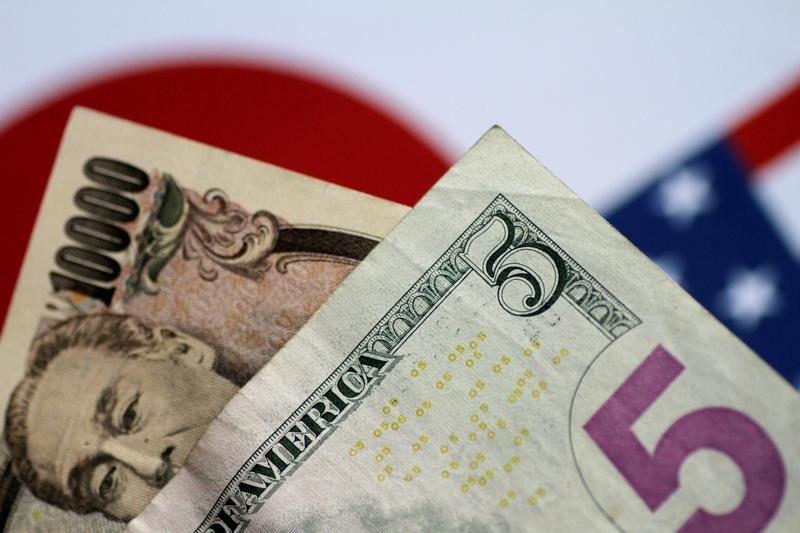Investing.com– Most Asian currencies weakened on Thursday, with the yen hitting a near one-month low after the Bank of Japan kept interest rates steady and flagged a cautious outlook.Â
But the biggest point of pressure on Asian currencies was a stronger dollar, as the greenback rallied to an over two-year high after the Federal Reserve slashed its outlook for interest rate cuts in the coming year.Â
The New Zealand dollar was also a major underperformer, trading at a more-than two-year low after gross domestic product data showed the country entered a recession in the September quarter.Â
Yen weakens, USDJPY at near 1-mth high after BOJ holds
The Japanese yen weakened on Thursday, extending overnight weakness after the BOJ kept rates steady in a nearly unanimous decision.Â
The yen’s USD/JPY pair rose 0.3% to cross 155 yen for the first time since late-November.
The BOJ kept rates steady and flagged a cautious outlook for 2025, amid signs of increasing inflation and sluggish Japanese economic growth.Â
While the BOJ’s decision was in line with a Reuters poll, it still disappointed some investors holding out for a December hike. The central bank had raised rates twice this year in a historic pivot away from ultra-loose policy.
Analysts still expect the BOJ to raise rates further, potentially in January or March.Â
Dollar at over 2-year high as Fed signals slower rate cutsÂ
The dollar index and dollar index futures rose slightly in Asian trade after racing to an over two-year high on Wednesday.
The greenback’s rally was spurred largely by the Fed. While the central bank did cut rates by 25 basis points on Wednesday, it signaled a substantially slower pace of rate cuts in 2025, amid sticky inflation and strength in the U.S. economy.Â
The Fed effectively halved its rate cut outlook for 2025, now predicting only two 25 basis point cuts, as compared to prior expectations for four cuts.Â
New Zealand dollar slumps as country enters recessionÂ
The New Zealand dollar’s NZD/USD pair slumped to a more-than two-year low on Thursday, after GDP data showed the country entered a technical recession in the September quarter.Â
GDP shrank 1.5% year-on-year in the quarter, much lower than expectations of a 0.4% contraction. The print marked a second consecutive quarter of negative GDP, confirming a technical recession.
The weak print sparked increased calls for more interest rate cuts by the Reserve Bank of New Zealand. The RBNZ slashed rates by a total 125 bps in 2024, and has signaled more easing to help support the economy.Â
Broader Asian currencies were nursing steep losses against the U.S. dollar, following hawkish signals from the Fed.Â
A slower pace of rate cuts bodes poorly for Asian markets, given that rate differentials between the dollar and regional currencies are likely to favor the greenback in the coming months.
The Indian rupee was among the worst performers in recent sessions, with the USD/INR pairing rising to a new record high above 85 rupees on Thursday.
The Australian dollar’s AUD/USD pair rose 0.2% after tumbling to a more-than two-year low.
The Chinese yuan’s USD/CNY pair rose 0.3% and touched its weakest level since September 2023. The yuan was also pressured by the prospect of looser monetary conditions in China, as the government flagged more stimulus measures to boost growth.
The South Korean won’s USD/KRW pair fell 0.4% after hitting its highest level in nearly 15 years, with continued political turmoil in the country adding to pressure on the won.
The Singapore dollar’s USD/SGD pair rose 0.1%.


